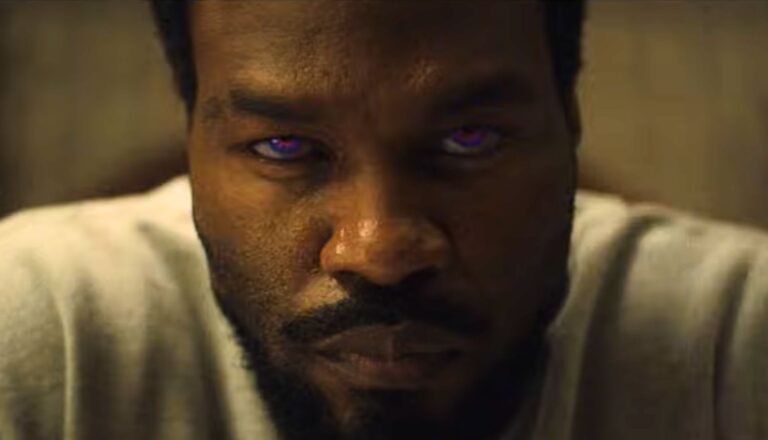
Wonder Man
For a superhero show, ‘Wonder Man’ is surprisingly light on violence, but a bit heavy on swearing, sexual allusions and meta-Hollywood references.

Larry Henderson absolutely, positively, definitely killed his wife.
Unless, y’know, he didn’t.
Oh, sure, the evidence doesn’t look all that promising. Larry was home, waiting for the cable guy, when wife Margaret was thrown through a glass window at the house. Those were his roller skate wheels that rolled through Margaret’s blood, leaving fresh red tracks around her body. When the police arrived, he did seem just as despondent over the no-show cable guy as he was over his wife’s murder.
Oh, and I probably should mention that before all this he was having an extramarital fling with his male fitness trainer.
“I was having sex outside of marriage,” he says. “I’d hardly call that an affair.”
Of course, there’s also the little matter of Larry’s first wife, who just happened to die after …. um, crashing through a plate glass window.
But Larry insists he’s innocent, and that’s good enough for lawyer Josh Simon. After all, the burden of proof rests with the prosecution, not the defense. Carol Anne Keane, the ambitious prosecuting attorney, has to show beyond a reasonable doubt that Larry’s guilty. And if there’s anything Josh has learned in his short time in East Peck, S.C., it’s that this whole case is about as unreasonable as it gets.
To defend Larry, and all his other crazy clients, Josh has assembled the best legal team East Peck has to offer—which, admittedly, isn’t much. Investigator Dwayne Reed was kicked off the police force after he plugged his own police cruiser with several bullets. (He thought it was being stolen, but in reality he’d just forgotten to put on the parking brake.) And Josh’s assistant, Anne Flatch, has so many strange psychological ailments that she could fill a whole psych ward by herself.
It doesn’t help that Carol Anne is gunning to become district attorney and, in order to prove her tough-on-crime bona fides, she’s gunning to put Larry to death. For her, it’s just a question as to whether she’ll settle for execution via electrocution or go for the gusto and insist on death by bear.
NBC’s Trial & Error spoofs the barrage of true crime narratives we’ve seen lately in entertainment, ranging from the Serial podcast to Netflix’s Making a Murderer docu-miniseries. Indeed, NBC allegedly loosely based this wacky sitcom off The Staircase, a true-crime miniseries that aired in France in 2004.
Our shared cultural fascination with watching real-life murder investigations spool out for entertainment is, arguably, troubling in its own right. So perhaps we should be relieved that the problems with Trial & Error aren’t nearly so subtle.
Trial & Error, can be funny, no question. Anchored by John Lithgow as the daffy accused, the show feels a bit like NBC’s late, little-watched-but-much-loved Community trapped in an American Crime-like saga.
But the show does dive into some unseemly places.
As we’ve already mentioned, Larry’s either gay or bisexual, and his sexual proclivities are an important part of both the prosecution’s case and the show itself. Moreover, just the mere fact that we mention Larry’s amorous preferences in this review would mark it—and presumably those of you for whom these sorts of things are important—as in league with what the show views as East Peck’s backward, conservative mindset.
Sexual dalliances, though, aren’t restricted to Larry or, as the show moves past the central murder case that launched it, Josh’s vast range of other clients. The show, while not perhaps obsessed with sex, is definitely preoccupied with it. Carol Anne and Josh have gotten to know each other in the bedroom as well as the courtroom (and Carol Anne especially can use suggestive, crass language as a means of seduction). Josh’s obsessive-compulsive forensics investigator engages in acts of “self-stimulation” whenever the work environment grows too stressful, sending him scurrying to a nearby bathroom whenever something critical happens. And so on.
Violence is rarely a problem in most sitcoms, and Trial & Error doesn’t feature a lot of explicit, on-screen mayhem. But an act of violence is critical to the show’s whole setup, and it’s not uncommon to see pictures or videos of bloody crime scenes. And while the show’s language rarely goes beyond the occasional “h—” or “d–n” explicitly, Trial & Error’s documentary conceit allows for a whole bunch of suggestive bleeps, many of which obviously conceal f- and s-words.
NBC’s sitcom has earned some praise from secular critics, and I get that. But when it comes to family viewing, Trial & Error feels like one long trial and a whole lot of error.
(Editor’s Note: Plugged In is rarely able to watch every episode of a given series for review. As such, there’s always a chance that you might see a problem that we didn’t. If you notice content that you feel should be included in our review, send us an email at letters@pluggedin.com, or contact us via Facebook or Instagram, and be sure to let us know the episode number, title and season so that we can check it out.)
Carol Anne, now with child, is determined to use her pregnancy to sway the jury’s verdict on Josh’s theatrical new client, Lavinia, who supposedly killed her husband.
A police officer finds dead bodies in Lavinia’s backyard (we don’t see the corpses, just the officer running away in horror). Lavinia passes out after learning about the bodies. Josh brags about making out with a girl in high school, and actually makes out with Carol Anne. Carol Anne video chats with Josh while naked (her private areas are blacked out). A woman makes a joke made about the male anatomy and a man injures his private area. Women wear short dresses and revealing shirts. People smoke cigarettes, discuss hard liquor and take shots of rum. People steal, lie and manipulate others. There’s a picture of a dead man’s face and discussion of possible murder weapons. A woman throws dishware in anger and a police officer accidentally shoots his gun in a home. A client is jokingly referred to as a vampire.
God’s name is misused twice and multiple profanities are bleeped out, including the f-word, “s—” and “a–hole.” Someone’s crude hand gesture is blurred.
In the show’s first two premiere episodes, Larry is accused of killing his wife by throwing her through a plate glass window. The wife’s well-to-do brother hires a northeastern firm to defend Larry, beginning with wet-behind-the-ears attorney Josh. But when it comes to light that Larry was having a homosexual liaison with his fitness trainer, the brother cuts off funding. Undeterred, Josh stays on.
In grainy surveillance footage, we see Larry and his lover kiss in a weight room. And while Larry insists he loved his wife, he also says that his “sexuality is fluid,” using a crude double entendre to admit he’s attracted to men. Prosecutor Carol Anne says that she could convict Larry on his homosexuality alone, given that the “buggery act of 1789” was never repealed (the lawbook depicts a crude, suggestive drawing allegedly from the period). She adds, by way of suggestive come on, that the law is rarely enforced. Carol Anne encourages Josh to sleep with her elsewhere, too, sometimes engaging in crude slang and metaphors. We see a black-and-white photo of several bulky soldiers posing in their underwear, with the photo supposed to convey comically homoerotic undertones. A forensics investigator is called by a documentary crew a “chronic masturbator,” and we see him run to a restroom on occasion to apparently engage in the act of self-stimulation.
We see video footage of the crime scene, the body of Larry’s wife still lying on the blood-covered floor. Other crime scene photos show more blood (tracked in circles by Larry’s roller skates) and a bloody handprint on a wall. Larry apparently lost all feeling in his left hand: We see him use it to hold a hot pan by its base and pick up a hamburger straight off a burning grill. A truck, along with a coffin toted in back, burst into flames at a gas station. A man shoots several bullets into the windshield of his own car. Defense assistant Anne faints whenever she sees something beautiful. Josh sets up his office next door to a taxidermy outfit: Stuffed animals litter the workspace, and a window looks right into the taxidermist’s work station.
We hear one “d–n,” one “h—” and three misuses of God’s name over the course of the two episodes. We’re also exposed to 15 censorious bleeps, with sometimes the words being bleeped being all-too-obvious. Characters smoke and drink, sometimes to apparent excess.

Paul Asay has been part of the Plugged In staff since 2007, watching and reviewing roughly 15 quintillion movies and television shows. He’s written for a number of other publications, too, including Time, The Washington Post and Christianity Today. The author of several books, Paul loves to find spirituality in unexpected places, including popular entertainment, and he loves all things superhero. His vices include James Bond films, Mountain Dew and terrible B-grade movies. He’s married, has two children and a neurotic dog, runs marathons on occasion and hopes to someday own his own tuxedo. Feel free to follow him on Twitter @AsayPaul.

Kristin Smith joined the Plugged In team in 2017. Formerly a Spanish and English teacher, Kristin loves reading literature and eating authentic Mexican tacos. She and her husband, Eddy, love raising their children Judah and Selah. Kristin also has a deep affection for coffee, music, her dog (Cali) and cat (Aslan).

For a superhero show, ‘Wonder Man’ is surprisingly light on violence, but a bit heavy on swearing, sexual allusions and meta-Hollywood references.

The content issues in ‘Memory of a Killer’ aren’t forgettable, but they’re tamer than most other shows in the “double life” genre.

All in all, Netflix’s ‘Finding Her Edge’ could use a bit more sharpening to hone its own edge.

Two families try to recover from a critical loss in the Wonder Project’s faith-tinged ‘It’s Not Like That.’ But the show has more content than you’d expect.